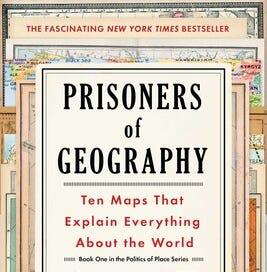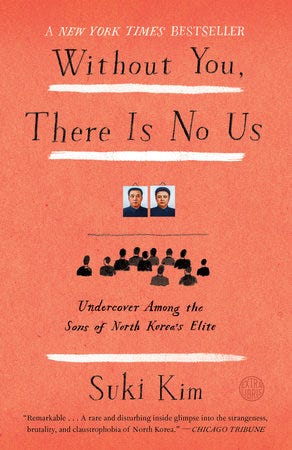After over a year in which travel has been limited to nonexistent, I find it comforting to read books about other people’s travel experiences, even if most of it took place pre-pandemic. Travel memoirs are a niche genre - full of personal self-discovery and sometimes comedic mishaps, but also great primers on the areas that the authors explore. Travel memoirs are often able to distill the history or culture of a place quickly (although potentially in a simplistic form), because the location is colored by the experience of the author. I’ve organized the following books by region, however, they are by no means exhaustive or representative of the area. Indeed, that is the beauty of the travel memoir. Three books about Paris will all be different because the personalization comes from the experience, background, and intent of the author. This list is also devoid of travel books in certain areas, which I hope to rectify with future reading. Until then, happy (armchair) travels!
The United States of America
Our Towns - James Fallows and Deborah Fallows
James and Deborah Fallows are a husband and wife team who decided to tour the United States by flying their single-engine prop airplane across the country for five years. During their travels they visit lots of small towns and cities and experience America’s geographical and cultural diversity. In each town they visit they attempt to address the major problems facing the area, as well as the signs of hope and renewal. I thought this book had lots of potential, but I was often annoyed by the lack of uniformity that the authors had in writing about a town. An underlying theme of the book was its exploration of what makes an American city successful or struggling, and yet they appeared to visit different types of institutions and use different standards to make this evaluation depending on where they were. However, if you are willing to look past those inconsistencies, Our Towns introduces readers to areas of the United States often overlooked in comparison to bigger cities.
Rating: 7.5/10
A Walk in the Woods - Bill Bryson
No list of travel memoirs is complete without a book by Bill Bryson. Bryson has a large catalog of travel books that span continents and countries, but in my opinion, Bryson’s quintessential work is A Walk in the Woods. Written in the humorous style that Bryson is known for, A Walk in the Woods details his trek along the Appalachian Trail during the late 1990s. Bryson hikes the trail with Stephen Katz, an old friend with no qualification to take such an arduous journey other than the fact that he was free and wanted to get into better shape. With the scene set, Bryson tells the story of their journey with humor and wit, while at the same time describing the nature they pass through, as well as the history of the Appalachian Trail itself. If you like listening to audiobooks, this book is even better in audio format.
Rating: 9/10
Asia
Sovietistan - Erika Fatland
Sovietistan is a quasi-memoir, quasi-history written by Norwegian journalist Erika Fatland about her travels through the countries of Central Asia: Turkmenistan, Kazakhstan, Tajikistan, Kyrgyzstan, and Uzbekistan. All five of these countries were once part of the Soviet Union, which had a substantial impact on their development and the shaping of national identities. With an eye towards detail and personal stories, Fatland explores the nuances of the Soviet relationship with these countries and the ways in which each government has developed in the years since the dissolution of the Soviet Union in 1991. One of the reasons that I loved this book so much is because of its focus on a region that is so commonly under-looked and understudied in the United States. For a region so large and with actual geopolitical considerations, the countries within Central Asia are generally ignored. Enter Fatland (and the beauty of travel memoirs), whose journey exposes readers to each nation’s fascinating cultural, political, and historical landscapes.
Fatland also recently released a new book, The Border, which is the account of her travels through all of the countries that border Russia. Similar to Sovietistan, Fatland writes about not only the countries that she is traveling in, but also the way that their identities and politics have been shaped (or literally created) by their border with the Russian Empire, the Soviet Union, and now the Russian Federation.
Rating: 9/10
Without You, There Is No Us - Suki Kim
Although it might be a stretch to call this a travel memoir given that Suki Kim barely travels, Suki’s experience teaching English at an all-male high school for the children of North Korean elites offers readers a rare glimpse into a closed North Korean society. While Suki lives amongst what counts as the privileged, her experience at this school is guarded, monitored, and lonely. Suki, a journalist, enters North Korea under the false pretense that she is an evangelical Christian missionary, and thus must keep up the charade the entire time she is present, lest she risk exposing herself to harsh North Korean justice. While at the school, Suki learns about the power of the state and the extent to which her students pledge their national allegiance, thereby giving her a more complete picture of how the state controls access to information and people’s daily lives. In the rare instances in which Suki is allowed to travel beyond the confines of the school, her experiences are closely monitored and guided by North Korean handlers eager to show her the curated version of their country that they want her to accept as more than just an illusion. For a society almost completely closed off from the rest of the world and one where an ordinary traveler will most likely never go, Suki Kim’s extraordinary 2015 memoir allows readers to visit and learn more about the Hermit Kingdom from the comfort of their own armchair.
Rating: 9/10
Europe
Four Seasons in Rome - Anthony Doerr
Anthony Doerr is probably best known for his best-selling novel, All The Light We Cannot See. Using the same lyrical prose that are featured in that work, Doerr writes about the year he and his family spent living in Rome after Doerr won the Rome Prize, a prestigious writing award that comes with a stipend and a writing studio for a year. Although his wife had just given birth to twins, they could not pass up on the opportunity to move to Italy, and what follows is a beautiful memoir of Doerr’s experience neatly divided into - you guessed it - the four seasons during which he and his family lived in Rome. Unlike some of the other books on this list, Doerr is not just passing through. Instead, the story is just as much about his experience as it is about the city itself, including the people he meets, the relationships he forges, and the history baked into a place as storied and breathtaking as Rome. If you want to feel both nostalgic and deeply embedded in a place, I can not recommend this book enough.
Rating: 9/10
The Almost Nearly Perfect People - Michael Booth
In ranking after ranking, Scandinavian countries are consistently rated as the best countries to live filled with the happiest people in the world. Michael Booth, a journalist from Denmark, wrote this book with the goal of dispelling the notion of a Scandinavian utopia. In travels throughout Finland, Iceland, Norway, Sweden, and Denmark, Booth explores the foundations of these countries, including their politics, cultures, and histories. Along the way, Booth tries to understand why these countries, which clearly have their own flaws and issues, are so consistently looked to as places to emulate.
Rating: 9/10
Global
Prisoners of Geography - Tim Marshall
Ok, quick exception to the theme for the final book on the list. Tim Marshall is neither traveling in this book nor is it his memoir. However, this is an excellent primer on geopolitics told through ten different maps that encompass the span of the world. Marshall uses these maps to explain how geographical boundaries (or the lack thereof) have shaped politics, conflicts, and propensity for economic growth. While I was previously aware of many of the geographical characteristics mentioned in the book, Marshall does a good job pulling geography and topographical features into the forefront of geopolitics by drawing through-lines between geopolitical events and the territory relevant actors occupy. And for all the ways that natural boundaries influence events, Marshall is also quick to point out how artificial and often arbitrary boundaries drawn by colonial powers have impacted national and continental development.
If this book interests you, Marshall has written three others with similar focuses - Divided: Why We’re Living in an Age of Walls; Worth Dying For: The Power and Politics of Flags; and his most recent, The Power of Geography: Ten Maps that Reveal the Future of Our World, the sequel to Prisoners of Geography.
Rating: 8/10
If you like what I’ve written or want to see more reviews, recommendations, and round-ups about a wide range of novels, histories, and more, consider subscribing now by entering your email. It’s free and it’s about books. What’s not to like?









